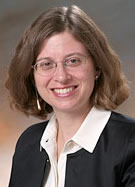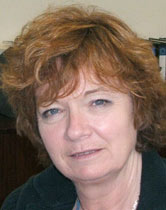| Programa del congreso TAEE 2010 | PROGRAMA FINAL | |
| Presentadores invitados | ||
| Dr. Julio Jorge González Universidad Estatal de Nueva York (SUNY) - New Paltz, Estados Unidos |
Reflexiones sobre Aspectos Didácticos en la Enseñanza de Ingeniería Eléctrica | |
 |
Dra. Susan Lord Catedrática y Coordinadora de Ingeniería Eléctrica de la Universidad de San Diego - Presidenta de la Sociedad de Educación del IEEE |
IEEE Education Society: Global Leader in Engineering Education |
 |
Patricia Manson Directora de la Unidad de Herencia Cultural y Aprendizaje Mejorado con la Tecnología de la Dirección General de la Sociedad de la Información y Medios de la Comisión Europea |
Learning in the 21st Century: Technology-Enhanced Learning and European Research |
| Programa | ||
| 13 de Abril de 2010 - Inauguración del congreso / Ponencia invitada / Sesiones técnicas / Acto social | ||
| 14 de Abril de 2010 - Ponencia invitada / Sesiones técnicas / Acto social | ||
| 15 de Abril de 2010 - Sesiones técnicas / Ponencia invitada / Clausura del congreso / Visita guiada a Ávila / Acto social | ||
| Dr. Julio Jorge González |
Dr. González cuenta con más de treinta publicaciones sobre control automático, circuitos electrónicos con realimentación, y métodos didácticos aplicados a la educación en ingeniería eléctrica. En el transcurso de su carrera, Dr. González ha recibido numerosas becas, otorgadas por el Consejo Británico (para hacer su Maestría), la Organización de Estados Americanos (para hacer su Doctorado), el gobierno de Alemania (beca para profesores “Konrad Zuse” para dar clases en la “Fachhochschule Regensburg”), y SUNY New Paltz (beca “Desarrollo Internacional” para trabajar en la Universidad Nacional de Educación a Distancia, Madrid y en la Universidad de Vigo, España). Como educador, ha obtenido numerosos premios, tales como el premio al mejor profesor del Departamento de Ingeniería Eléctrica de CSU, el premio al mejor profesor del Departamento de Ingeniería Eléctrica de SUNY New Paltz, y el prestigioso premio “Excelencia en la Educación”otorgado por el Sumo Presidente de las universidades pertenecientes al sistema SUNY. Reflexiones sobre Aspectos Didácticos en la Enseñanza de Ingeniería Eléctrica Es esta presentación, voy a considerar diferentes aspectos educativos en Ingeniería Eléctrica, basados en mi experiencia de veintiséis años como docente universitario en instituciones de Argentina, Estados Unidos, Alemania y España. Dichos aspectos se refieren a las siguientes tareas didácticas: A) explicar a los estudiantes el proceso cognoscitivo inherente en la asimilación de conceptos de ciencia e ingeniería, B) buscar fehacientemente (hasta encontrarlo) el método más efectivo y simple para transmitir conocimientos en un tema específico, C) integrar temas aparentemente disímiles, mediante la aplicación de ejemplos clarificadores y D) fomentar en el estudiante la necesidad de crear una “expectativa teórica” de la solución a un problema determinado, antes de efectuar simulación en el ordenador. La presentación será ilustrada por situaciones derivadas de mi experiencia docente. Por ejemplo, para el punto B utilizaré un sencillo y poderoso método para explicar la Teoría de la Relatividad Especial que se basa simplemente … ¡en el Teorema de Pitágoras! Para el punto C, aludiré a las propiedades aparentemente “mágicas” de la Transformada de Laplace, una herramienta que se utiliza para obtener respuestas disímiles, tales como la respuesta a la “excitación escalón” y la respuesta de frecuencia. En cuanto al punto D, presentaré ejemplos en los que la omisión de generar una expectativa teórica, conlleva al estudiante a cometer graves errores en la simulación. |
| Dra. Susan Lord |
|
IEEE Education Society: Global Leader in Engineering Education The IEEE Education Society (EdSoc) is pleased to be a sponsor of EDUCON and technical co-sponsor of TAEE. EdSoc leaders view this conference as vital for carrying out the mission of our society and believe that EDUCON will be at the forefront of global Engineering Education in the future. In this talk, I will describe some of the history of the Education Society, its recent strategic planning process, and its hopes for the future. What is the Education Society? In April 2009, EdSoc leaders developed new vision and mission statements to introduce EdSoc to the world. The vision of EdSoc is “The IEEE Education Society strives to be the global leader in Engineering Education”. The mission is “The IEEE Education Society is an international organization that promotes, advances, and disseminates state-of-the-art scientific information and resources related to the Society’s field of interest and provides professional development opportunities for academic and industry professionals”. Currently, EdSoc has about 3000 members globally including 30% from IEEE’s Region 8 (Europe, the Middle East, and Africa) and 10% from Region 9 (Central and South America). Strengths of the Education Society include being globally engaged, recognized, and sought after to collaborate in educational innovation, generating quality publications and conferences, and dedicated leadership. |
| Patricia Manson |
Learning in the 21st Century: Technology-Enhanced Learning and European Research The presentation will explore the challenges facing learning in the 21st century and describe the role of European research in technology enhanced learning in this changing context. Experience has revealed the importance of giving equal weight to the technologies, to the learning and to the improvements in learning and this balance is at the core of technology-enhanced learning |










